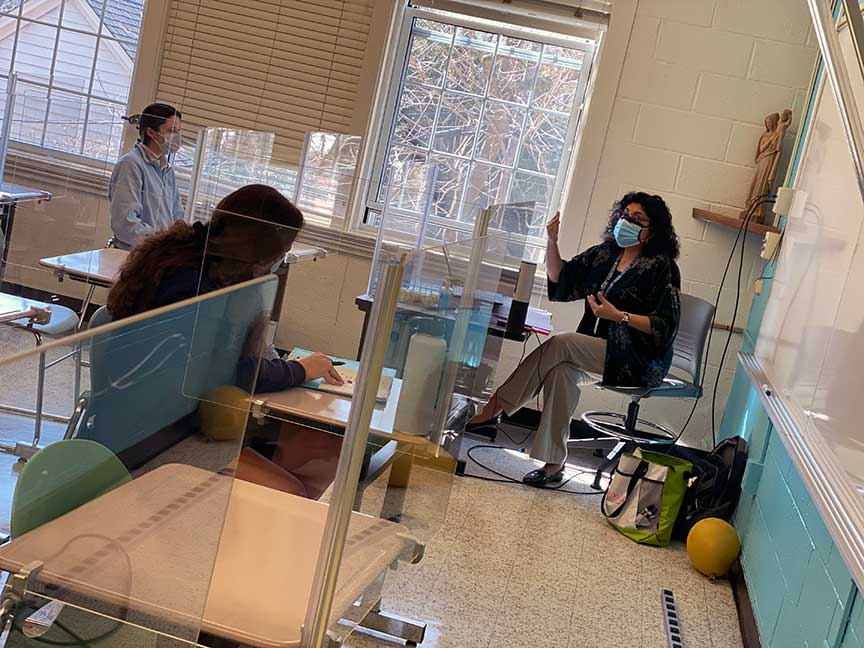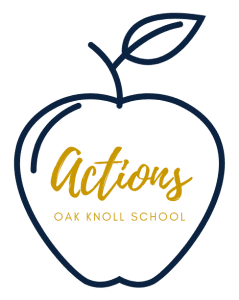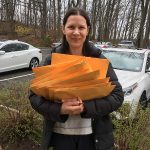Q&A: Veronika Zavaleta-Tejeda, World Language Department Chair
 Actions is a new editorial feature from Oak Knoll School of the Holy Child. Each week we will spotlight the dedicated faculty and staff across the PK-12 campus who make a difference in the lives of OKS students and the life of the school. This week, we feature:
Actions is a new editorial feature from Oak Knoll School of the Holy Child. Each week we will spotlight the dedicated faculty and staff across the PK-12 campus who make a difference in the lives of OKS students and the life of the school. This week, we feature:
Veronika Zavaleta-Tejeda
World Language Department Chair
Q: As Upper School World Language Department Chair for grades 7-12, can you talk a bit about the fundamentals of Oak Knoll’s world language curriculum and how it these skills prepare students for studying a language in college and later in their careers?
A: Our department currently offers full programs from beginner levels to AP-level courses in French, Spanish and Latin. In French and Spanish, our goal is to teach the language through an emphasis and equal attention to the development of four skills (listening, speaking, reading, and writing). Meanwhile, in our Latin program, students consistently engage in authentic texts through grammar and translations. Equally important is exposure to the richness and diversity of Francophone, Hispanic and Roman culture. Learning a language is not just learning vocabulary lists and memorizing conjugations, it also entails learning about the people related to that culture, their history, their literature, and their worlds through which our students make cultural connections and comparisons. It also heightens their social emotional intelligence, improves their critical thinking skills, and gives them a competitive advantage both in college and once they enter the workforce.
Q: What has been your favorite world language project/activity that you have worked on with your students and how do you make it fun?
A: I have taught all levels of Spanish during my tenure at Oak Knoll. Currently, I am teaching Honors Spanish 4 and Honors Spanish 5. One of my favorite projects that students enjoy, is the “Influencer” project, where students create a YouTube video and pretend to be an influencer. Their task is to plug a product and convince me to purchase it. My students are so creative in their content and video editing, and in creating their influencer personality. Their videos are quite polished, their language is precise, and I’m always convinced to purchase or use their products.
Q: The OKS world language curriculum is centered on teaching our students to communicate. Can you please explain this process?
A: Since Latin is not a spoken language, the emphasis on teaching students to communicate in another language is a primary focus in our French and Spanish programs. This process is one that takes time, but we create our courses to build our student’s receptive and productive skills, understanding that production comes later.
Q: What are some teaching methods that you use to help our students develop a love of language and why is this important?
A: Personalizing instruction is important because it helps students make connections between their interests and lives, and the material they are learning. Whether we are discussing a new TikTok challenge, a favorite movie, show or song in the target language, creating opportunities for real world connections is essential. Pictures are also something I leverage in the classroom as they help promote discussion and are a creative way for students to engage in story telling in Spanish. In general, our department focuses on using authentic materials in the classroom, such as commercials, movie clips, news articles, art, and music to keep students engaged. Exposure through this cultural realia helps develop a student’s appreciation and love of the language which is crucial nowadays for myriad reasons. First, it gives students a new way to look at life, language, and culture. Second, it opens a student’s mind to a world different than theirs which leads to a respect for cultural differences and gives the student the ability to effectively work with people from a range of cultural and social backgrounds. Lastly, when you literally have the world at your fingertips via your cell phone, it helps to be able to know another language so that you can communicate with people in their native tongue. As Nelson Mandela famously said, “If you talk to a man in a language he understands, that goes to his head. If you talk to him in his language, that goes to his heart.”
Q: Can you briefly share your career trajectory in world language? What’s the most important thing you’ve learned along the way and that you hope to pass down to your students?
A: I have always loved languages. I grew up bilingual and bicultural (of Peruvian descent), and Spanish was the first language I spoke. When I took my first Hispanic Literature course in college, I discovered a world unknown to me. In graduate school, I studied Peninsular and Latin American literature from medieval to modern times. During this time, I studied Portuguese and quickly placed out of that language. I then decided to study Italian, and I can still hold a conversation and understand it very well. I also studied some French and have reading knowledge of that language. While in graduate school, I was a teaching assistant in introductory university level Spanish classes which then lead me to Oak Knoll and a career in education.
What I have learned is applicable outside of my discipline. The first is that you have to love your students, all of them. With that love comes respect for who they are and where they are in their learning journey. The second, is that learning is experiential. Ten years from now, students may not remember the content you taught them, but they will always remember how they felt in your class, the experiences you provided for them and how you made them feel. So, after taking a class with me, I hope my students can appreciate and discuss the enormous diversity that exists within the spectrum of Hispanic culture and use their Spanish to make this world a better place.
Veronika Zavaleta-Tejeda has been teaching at Oak Knoll for 18 years. In her time at Oak Knoll, she has taught all levels of Spanish and has served as the World Languages Department Chair for a total of seven years. She is currently the ninth-grade homeroom coordinator and has been the moderator of La Vista, Oak Knoll’s Spanish newsletter since its inception in 2003. When she is not teaching, Veronika loves spending time with her husband, Juan, and twins Victoria and Juan Pablo. In her spare time, she also enjoys cooking, listening to audiobooks and exercising.







